Формування гнучких навичок спілкування здобувачів вищої освіти у процесі навчання іноземної мови професійного спрямування
Анотація
Дослідження присвячене проблемі формування гнучких навичок спілкування здобувачів вищої освіти у процесі навчання іноземної мови професійного спрямування. На основі результатів аналізу наукових публікацій доведено, що в умовах сучасного ринку праці комунікативна гнучкість та адаптивність фахівців є запорукою їхньої конкурентоспроможності. Здійснено теоретичний аналіз сутності поняття «гнучкі навички спілкування», виокремлено його структурні компоненти, пріоритетні для іншомовного професійного спілкування. З’ясовано, що навчання іноземної мови за професійним спрямуванням має свої особливості, пов’язані зі специфічними потребами та вимогами професійної діяльності (специфічні аспекти мовного матеріалу; чітка спрямованість на розвиток практичних навичок ділового спілкування, які допоможуть майбутнім фахівцям ефективно спілкуватися з колегами, клієнтами та партнерами у професійному середовищі; врахування можливостей формування міжкультурної компетентності майбутніх фахівців, що сприятиме кращому розумінню представників різних культур та налагодженню контактів). За результатами опитування та анкетування здобувачів вищої освіти виявлено основні труднощі у розвитку комунікативної гнучкості майбутніх фахівців, до яких належать вивчення спеціалізованої лексики, адаптація теоретичних знань до практичних ситуацій, взаєморозуміння в міжкультурному середовищі та подолання психологічних бар’єрів. У дослідженні науково обґрунтовано ефективні методи та структуровані інтерактивні стратегії, засновані на практичному застосуванні мови, деривації термінів та виконанні умовно-мовленнєвих завдань, які дозволяють досягти успішних результатів і розкрити потенціал студентів у вивченні іноземної мови та взаємодії з носіями цієї мови в професійному оточенні. Перспективними напрямами подальшої роботи визначено використання можливостей штучного інтелекту, ефективних методів оцінювання гнучких навичок комунікації на заняттях іноземної мови професійного спрямування.
Завантаження
Посилання
Didenko, Zh. (2021). Formuvannia m’iakykh navychok (“soft skills”) na zaniattiakh anhlijs’koi movy u majbutnikh menedzheriv v umovakh dystantsijnoho navchannia [Formation of soft skills in English language classes for future managers in the context of distance learning.]. Aktual’ni pytannia humanitarnykh nauk [Current issues in the humanities]. 35(2), S. 266-271. URL: https:// openedu.kubg.edu.ua/journal/index.php/openedu/article/view/256. DOI: https://doi.org/10.28925/2414-0325.2019s8 [in Ukrainian].
Espina-Romero, L. C., Aguirre Franco, S. L., Dworaczek Conde, H. O., Guerrero-Alcedo, J. M., Ríos Parra, D. E., & Rave Ramírez, J. C. Soft skills in personnel training: Report of publications in scopus, topics explored and future research agenda. Heliyon. 2023
Apr 14;9(4):e15468. DOI: 10.1016/j.heliyon.2023.e15468. PMID: 37123950; PMCID: PMC10130224. https://pubmed.ncbi.nlm.nih.gov/37123950/
Hlazunova, O. H., Voloshyna, T. V., & Korol’chuk, V. I. (2019).Rozvytok “soft skills” u majbutnikh fakhivtsiv z informatsijnykh tekhnolohij: metody, zasoby, indykatory otsiniuvannia [Development of «soft skills» in future information technology specialists: methods, tools, assessment indicators.]. Vidkryte osvitnie e-seredovysche suchasnoho universytetu [Open educational e-environment of a modern university]. Spetsvyp. 93–106. URL: https://openedu.kubg.edu.ua/journal/index.php/openedu/article/view/256 DOI: https://doi.org/10.28925/2414-0325.2019s8 [in Ukrainian].
Kokhan, O. M. (2020). Soft skills iak neobkhidnyj komponent konkurentospromozhnosti majbutnikh fakhivtsiv [Soft skills as a necessary component of the competitiveness of future professionals]. Soft skills – nevid’iemni aspekty formuvannia konkurentospromozhnosti studentiv u XXI stolitti: Mizhvuzivs’kyj naukovo-metodychnyj seminar. [Soft skills are integral aspects of students’ competitiveness in the XXI century: Interuniversity scientific and methodological seminar]. Kyiv: KNTEU, 43–45. [in Ukrainian].
Kontseptsiia rozvytku tsyfrovykh kompetentnostej. Rozporiadzhennia vid 3 bereznia 2021 r. № 167-r. [The concept of digital competence development. Order of 3 March 2021. No. 167-p] URL:https://zakon.rada.gov.ua/laws/show/167-2021-%D1%80#Text [in Ukrainian].
Nikolaienko, Yu. (2022). Rozvytok navychok spivrobitnytstva u protsesi formuvannia hramatychnoi kompetentsii majbutnikh perekladachiv [Development of cooperation skills in the process of developing the grammatical competence of future translators.]. Aktual’ni problemy inozemnoi filolohii ta perekladoznavstva [Topical issues of foreign philology and translation studies]. 56(4),. 193-198. DOI https://doi.org/10.24919/2308-4863/56-4-33 [in Ukrainian].
Osova, O. O. Vykorystannia tekhnolohij shtuchnoho intelektu dlia imitatsii real’nykh komunikatyvnykh sytuatsij na zaniattiakh inozemnoi movy profesijnoho spriamuvannia [The use of artificial intelligence technologies to simulate real-life communication situations in EFL classes.]. Novi pidkhody do navchannia inozemnykh mov: pidvyschennia iakosti osvity – shliakh do formuvannia intelektual’noho kapitalu [New approaches to teaching foreign languages: improving the quality of education is a way to build intellectual capital]: Materialy KhKhKhIII zasidannia shkoly-seminaru (08.11.2023). Kharkiv: KhNU imeni V.N. Karazina. S. 10-15. [in Ukrainian].
Pasyk-Kosarieva, N. O. (2020). Osnovni navychky soft skills, iaki znadobliat’sia studentu KhKhI stolittia dlia uspishnosti u zhytti ta kar’ieri [The basic soft skills that a student of the 21st century will need to succeed in life and career.]. Soft skills –nevid’iemni aspekty formuvannia konkurentospromozhnosti studentiv u XXI stolitti: Mizhvuzivs’kyj naukovo-metodychnyj seminar. [Soft skills are integral aspects of students’ competitiveness in the XXI century: Interuniversity scientific and methodological seminar]. Kyiv: KNTEU, 68–70. [in Ukrainian].
Pro vyschu osvitu: Zakon Ukrainy vid 2014, № 37-38, st.2004 zi zminamy vid 27.12.2023 [On Higher Education: Law of Ukraine of 2014, No. 37-38, Art. 2004 as amended on 27.12.2023] https://zakon.rada.gov.ua/laws/show/1556-18#Text [in Ukrainian].
Schehlova, A. O. (2021). Formuvannia hnuchkykh navychok u zdobuvachiv vyschoi osvity pry vykorystanni platform dystantsijnoho navchannia u vykladanni inozemnoi movy. [Developing flexible skills in higher education students when using distance learning platforms in teaching a foreign language.] Inzhenerni ta osvitni tekhnolohii [Engineering and educational technologies], 9(1), 28-39. URL: http://dspace.nuft.edu.ua/handle/123456789/34123 [in Ukrainian].
Semenoh, O., & Kul’babs’ka, O. (2021). Formuvannia m’iakykh navychok studentiv-filolohiv u mizhrehional’nomu proiekti z infomedijnoi hramotnosti [Developing soft skills of philology students in an interregional project on infomedia literacy]. Pedahohichni nauky: teoriia, istoriia, innovatsijni tekhnolohii [Pedagogical sciences: theory, history, innovative technologies], 4(108),
-247. URL: https://www.repository.sspu.edu.ua/handle/123456789/12012 DOI 10.24139/2312-5993/2021.04/231-247 [in Ukrainian].
Shestakova, S. O. (2020). Vykorystannia interaktyvnykh metodiv navchannia dlia formuvannia soft skills u studentiv iurydychnoho profiliu [Using interactive teaching methods to develop soft skills in law students.]. Pedahohichni nauky: teoriia, istoriia,innovatsijni tekhnolohii [Pedagogical sciences: theory, history, innovative technologies], 2(96), 224-233. URL:https://repository.sspu.edu.ua/bitstream/123456789/9010/1/ Shestakova_Vykorystannia.pdf) DOI 10.24139/2312-5993/2020.02/224-233 [in Ukrainian].
Stratehiia rozvytku vyschoi osvity v Ukraini na 2022 – 2032 roky. Rozporiadzhennia vid 23 liutoho 2022 roku №286-r. [Strategy for the Development of Higher Education in Ukraine for 2022-2032. Order of 23 February 2022 No. 286-p.] 1-34. URL: https://mon.gov.ua/storage/app/media/news/2022/04/15/VO.plan.2022 2032/Stratehiya.rozv.VO-23.02.22.pdf [in Ukrainian].
Zvarych, I. M. (2020). Spilkuvannia – nevid’iemna skladova Soft Skills u formuvanni konkurentospromozhnosti studentiv KhKhI stolittia [Communication is an integral part of Soft Skills in shaping the competitiveness of students in the 21st century.].
Soft skills – nevid’iemni aspekty formuvannia konkurentospromozhnosti studentiv u XXI stolitti: Mizhvuzivs’kyj naukovo-metodychnyj seminar [Soft skills are integral aspects of students’ competitiveness in the XXI century: Interuniversity scientific and methodological seminar]. Kyiv: KNTEU,. 37–40. [in Ukrainian].




